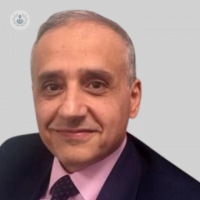A holistic approach to heart health
Written in association with:Heart health is paramount to overall well-being, and adopting a holistic approach can significantly enhance cardiovascular function. This encompasses not only physical health but also mental and emotional well-being, creating a comprehensive strategy for a healthy heart.
We speak to leading consultant cardiologist Dr Mohamed Al-Obaidi, who explains the key components to maintaining heart health.

What is the role of nutrition in maintaining heart health?
Nutrition plays a critical role in maintaining heart health and preventing cardiovascular diseases. A balanced diet rich in fruits, vegetables, whole grains, and lean proteins significantly reduces the risk of heart-related conditions by providing essential nutrients, fibre, and antioxidants that support heart function and lower cholesterol levels. Foods high in omega-3 fatty acids, such as salmon, chia seeds, and flaxseeds, help reduce inflammation and lower triglyceride levels, further protecting heart health.
On the contrary, limiting processed foods, saturated fats, and added sugars is vital, as these contribute to hypertension and atherosclerosis—major risk factors for heart attacks and strokes. Mindful dietary choices can enhance cardiovascular health.
How does physical activity affect heart health?
Regular physical activity is a vital component of a comprehensive approach to heart health. Engaging in at least 150 minutes of moderate-intensity exercise each week—activities such as brisk walking, cycling, or swimming—can significantly enhance heart function by promoting better blood circulation and reducing blood pressure. These exercises also play a crucial role in weight management, helping to prevent obesity, which is a major risk factor for cardiovascular diseases.
In addition to aerobic activities, incorporating strength training exercises at least twice a week is beneficial for improving muscle tone and metabolic efficiency. Strength training helps build lean muscle mass, which can increase metabolism and aid in calorie burning. Together, aerobic and strength training exercises contribute to overall cardiovascular health, making physical activity an essential element of a heart-healthy lifestyle.
Furthermore, regular exercise can improve mental well-being by reducing stress and anxiety, which are also important for maintaining a healthy heart. By prioritising physical activity, individuals can significantly lower their risk of heart disease and enhance their overall quality of life.
Stress management
Effective stress management is essential for maintaining heart health, as chronic stress can have detrimental effects on the cardiovascular system. Prolonged stress can lead to elevated cortisol levels, which contribute to increased blood pressure and inflammation, both significant risk factors for heart disease.
Techniques such as mindfulness meditation, yoga, and deep-breathing exercises are particularly effective in reducing stress and promoting relaxation. Mindfulness meditation encourages individuals to focus on the present moment, helping to alleviate anxiety and improve emotional resilience. Similarly, yoga combines physical movement with breath control, fostering a sense of calm and balance.
The importance of quality sleep
Quality sleep is frequently underestimated yet plays a vital role in maintaining heart health. Adults are advised to aim for 7 to 9 hours of restorative sleep each night to enable the body to repair and regenerate effectively. During sleep, critical processes occur, such as the regulation of hormones that control stress and appetite, both of which are essential for maintaining a healthy weight and blood pressure.
Conversely, poor sleep patterns have been linked to an increased risk of hypertension, obesity, and diabetes—key risk factors for heart disease. Furthermore, inadequate sleep can lead to heightened inflammation and disrupted heart rhythms, further exacerbating cardiovascular issues.
Prioritising good sleep hygiene, such as establishing a regular sleep schedule, creating a relaxing bedtime routine, and minimising screen time before bed, can enhance sleep quality and, in turn, promote heart health. By recognising the importance of sleep, individuals can take proactive steps to protect their cardiovascular system and improve overall well-being.
Lastly, fostering social connections and emotional well-being plays a significant role. Strong relationships and a supportive social network can reduce stress and promote a sense of belonging and happiness, all of which are beneficial for heart health.
By integrating these elements—nutrition, physical activity, stress management, sleep, and social connections—a holistic approach provides a robust framework for maintaining a healthy heart and preventing cardiovascular diseases.
If you are concerned about heart health and would like to book a consultation with Dr Mohamed Al-Obaidi, simply visit his Top Doctors profile today.


